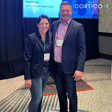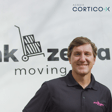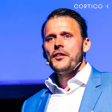Become a Creator today!Start creating today - Share your story with the world!
Start for free
00:00:00
00:00:01

The power of customer empathy, with Len Devanna
Most business leaders in 2024 know that customer experience is important. Whilst that is undoubtedly a good thing, the gap between intention and outcomes remains vast. How do you go from talking the talk, to walking the walk?
Len Devanna has spent a career helping businesses answer that very question. Len is a VP at Acquis Cortico-X. His CV is a catalogue of transformational roles with extraordinary brands.
Get in touch with Acquis Cortico-X here.
Follow Acquis Cortico-X on LinkedIn here.
Follow Len on LinkedIn here.
Register to hear Len at 'The Martech Conference' here.
Transcript
Introduction and Purpose of Aquas Cordico X
00:00:00
Speaker
AQUAS Cordico X is an experience-led transformation business that partners with clients and technology companies to drive digital acceleration. We are experienced activists, passionate about elevating everyday human experiences through the belief that what's best for people is what's best for an organization. Reach out to us for a chat. A link is in the show notes. Now cue the jingle.
Introducing 'Speaking from Experience' Podcast
00:00:37
Speaker
Hello and welcome to the inaugural episode of Speaking from Experience from Aquas Cordico X. I'm Will Kingston.
The Gap Between Customer Experience Intentions and Outcomes
00:00:46
Speaker
Almost every business leader in 2024 knows that customer experience is important. In fact, I challenge you to find a single business that doesn't have a variation of customer centricity as one of its values. Whilst that's undoubtedly a good thing, the gap between intention and outcomes remains vast.
00:01:06
Speaker
Too many customer journeys are merely pretty posters on the wall instead of tools to guide experience initiatives. Too many customer listening programs provide an arbitrary number for CX performance without a plan to improve it. Too many organizations stand up peripheral CX teams without considering how to reorient their call around the customer. How can we go from talking the talk to walking the walk?
00:01:31
Speaker
My guest today has spent a career helping businesses answer that very question.
Guest Introduction: Len Devana's Background
00:01:36
Speaker
Len Devana is a VP at Aquas Cortico X. His CV is a catalogue of transformational roles with extraordinary brands. Len, welcome to Speaking from Experience. Thank you so much, friends. It's delightful to be here.
00:01:49
Speaker
We'll get to your journey through the worlds of CXN marketing in a second, but I want to start a little earlier. So when we first met, I had noted that you had a voice for radio. I was careful not to say a face for radio. Thank you. Our research team, which truth be told may just be me and Google, suggests that I may have actually been on the money. Tell me about it.
00:02:14
Speaker
True story, way back in the day at the ripe old age of 15, and don't ask me how this happened, I managed to find my way into a proper radio gig, and I started off doing early Sunday morning shows, give this spot that no one wants to the kid, but then surprisingly found myself doing Monday through Friday drive time after very long. So it was good fun, and it really gave me an early intro into getting a personality out there, being me,
00:02:45
Speaker
And I'll tell you it was awkward going through having that job while going through puberty and having your voice changed all over the map. Here we are. You reflect on that. Are there any lessons that you think are analogous between those early days and then how you would approach a career in the corporate world? Yeah, I think that those early days gave me, they helped me get to know myself and I suspect to some extent they helped me understand, for lack of a better term,
00:03:13
Speaker
optics in theater, and really more importantly, I guess, presentation. And today, some many, many years later, I fancy myself a storyteller, and storytelling has been one of my most powerful tools in my toolkit, and I suspect that harkens back to that day of having to convey concise points through a microphone with no other connection to the audience.
00:03:36
Speaker
A really insightful point. I can't think of many great business leaders that I've come across that aren't also great storytellers. Let's move forward. Tell me about your journey in marketing initially and then into the world of CX. Yeah, of course. I'm very, very fortunate. I've had an amazing career and I'm humbled by it. I actually started in the technology sector back after my infamous radio days, jumped into tech.
Len's Career Journey and Insights on Customer Experience
00:04:02
Speaker
And I started early on in IT, where I was thinking more about systems and help desks and supporting employees. I will fast forward considerably. That was very early days, early days of web, brought me to roles in marketing. Folks in marketing were sort of looking at what we were doing in the technology side and said, hey, that's interesting. There are applications to marketing, which pulled me from a technical background to marketing background. And that really was served as a launch pad for me personally, thinking about
00:04:30
Speaker
How do you leverage this digital medium, which at the time was sort of new for all of us. We were trying to figure out what its place was in the enterprise. How do you leverage this to grow your business and to do good by your customers? I spent an awful lot of time in the tech sector helping rewire businesses. It's very rewarding. I could talk ad nauseam about lessons learned and stories in progress that I wanted to expand beyond tech, along with some friends who'd strapped to a small boutique consulting firm, focus on experience excellence.
00:04:59
Speaker
We were very, very successful very, very quickly, such that we had many suitors trying to pick us up. We ended up joining Pricewaterhouse, where I spent the next several years running PwC Silicon Valley Experience Center. I had the pleasure of walking the halls of the best, the biggest and the best brands we know and love today.
00:05:16
Speaker
Did that for a period of time, another stint in consulting, then jumped interestingly into the automotive sector. I have a passion for EVs. I got a call from Lucid Motors and they asked me to join and help them think through among other things, global customer experience. So the headline there is half a career in consulting and the other half a career in client side roles. But what's interesting to me and arguably the most important lesson I pulled through from all this time is that I've come to appreciate only in hindsight, it doesn't matter if you're selling a cup of coffee at Starbucks and iPad at Apple.
00:05:46
Speaker
or a $100,000 supercar at Lucid Motors, there's a common thread that spans industries and products, and that is experience. And that, I've only recently come to understand that my entire career has led me to this place of passion for experience excellence and the recognition of how a focus on experience can meaningfully move a business forward. Hence my passion today, hence why I've joined the team at Cortico X, because as you know as well as I, that is almost our religion.
Customer Experience: A Holistic Approach
00:06:16
Speaker
Well, let's move to that notion of experience because it's one of those terms in the business world now that means a million different things to a million different people. That actually, I think, is a bit of a challenge. I think that's one of the reasons why customer experience sometimes doesn't get the traction at the highest levels of organizations that it should because it's not as well understood. What does customer experience mean to you? Yeah, it's a great question. It's the right question.
00:06:42
Speaker
it's thrown around too much in industry. And until we sort of align on what it is, we can't really move it forward. For me, experience, I think about, first of all, we put the human at the center of everything. As we think about a strategy or an experience, it all starts with the human being, because we are not selling to robots, we are selling to one another. So I think about the, I start with the human every time, but then I think about how does you, how do you or I go about
00:07:09
Speaker
purchasing a new set of sneakers, new health insurance, perhaps a new car. It almost doesn't matter what the product or the service is. There's an experience around it. And the very simplistic notion of that experience is first, you have to start by discovering a brand or its products exist. Then they work your way. If they've got a compelling value proposition, they work their way into your consideration set. If you've started discovering a brand, now you're considering that brand.
00:07:35
Speaker
done right, you move on to transaction and then you have some sort of a transaction with the company, whether that's buying a product or subscribing to a service. And if all these things are done right, then you move that person to become an advocate for your business. Right. So that's how I think of the highest level of experience to sever, discover, consider, transact and advocate. But if you think about that journey, there are a hundreds, if not thousands of touch points, some physical, some digital,
00:08:03
Speaker
And the implication, so to me, experience is the sum of those parts. It is, it is how do those parts come together to meaningfully move your audience, in this case, your customer through that journey. And the implications are significant. They require almost a deconstruction of traditional organizing models, because if marketing is thinking top of funnel, sales is thinking kind of bottom of funnel, and service is nowhere on the map because the traditional
00:08:27
Speaker
customer funnel doesn't really think about the post-sale. We fail miserably. So to me, experience is the sum of the parts that transcend that journey and success requires organizations to rethink how they bring that to market.
00:08:42
Speaker
There's an interesting little insight there, uh, where you referred to, I guess, organizational structures. And it's fascinating that most organizational structures are still based on thinking that is outdated. Those old product and functional silos that inevitably mean, which are inevitably anathema to a customer first mindset, because it's very hard to look at an end to end journey. If you're only responsible for a particular product or a particular servicing or functional responsibility.
00:09:12
Speaker
terms of that organizational structure piece, how do you go about reorienting that around the customer? I think that's where everyone's struggling today. You know, and we all, we all organizations at large walking around talking about the importance of experience, but to your earlier point, it's difficult to move it forward. And I think we are mired in the organizational paradigms of yesterday. Now, I also think it would be naive to suggest let's deconstruct how we've organized business in the past 400 years and reinvent it.
00:09:42
Speaker
That's not realistic. But in my experience with the work I've done, magic comes when you bring the voice of the customer into your business as a beacon and you use it as a unifying force.
00:09:59
Speaker
entire customer journey. Most of my biggest successes have come by simply what I like to describe as holding up the mirror for a client or for an employee I'm working for and saying, Hey, this is what we look like from the outside in our prospect, our customer, they don't care that they're frustrated with marketing or sales or service organization. They're dealing with the brand. They don't see us like we see us.
Challenges and Strategies for Implementing Customer-Centric Approaches
00:10:22
Speaker
So, you know, in lieu of deconstructing and re-imagining an organizational paradigm for today,
00:10:29
Speaker
I think we can move forward if we rally around together that voice of the customer and we just keep a steadfast focus on who are we trying to serve here and how do we serve them in a meaningful manner to keep them pressing through that journey, but also advocating us not only buying more of our stuff, whatever that may be, but telling all of their friends. So voice of customer is arguably the best beacon I've used throughout my career.
00:10:57
Speaker
And I would suggest most organizations now have some form of a voice of customer program, obviously, varying levels of maturity. So that's a tick. A challenge that I often see is that you will get a customer insight, you will then identify a challenge in your organization, but when it comes to getting budget to fix that challenge, it sometimes is very difficult to convince people of the ROI of customer initiatives. How do you move past the
00:11:24
Speaker
rhetoric that customer is important to actually getting buy-in and dollars behind these initiatives. Two different thoughts. You mentioned the lead into your question was most organizations have this today or they're thinking about this today. And I would challenge that point. I believe that organizations today are wired to listen to conversations addressed to them. What I mean by that
00:11:48
Speaker
I'm an angry consumer. I'm on Twitter, Twitter X. I am complaining to you about something. And my assumption is you have a team of people on the other side listening for those signals and responding to them. That is a conversation directed at you. And I would argue that is maybe 20% of the conversation.
00:12:07
Speaker
The other 80% is the conversation about you. It's not necessarily addressed to you. It is not conveniently posted in your Facebook page or what have you. It is spread throughout the ethos of the internet. And there is as much, perhaps more merit, listening to and understanding the conversations about your brand as there is to conversations addressed to your brand. There is more value in the 80%. So out of the gate, I would suggest virtually every company on planet earth
00:12:37
Speaker
enormous opportunity to reimagine, rethink how they're listening to customer insights and tapping into those. To your point around, yep, data is great. Insights are great. Verbatims are great. How do you move it forward?
00:12:49
Speaker
A couple of different thoughts. I won't name names, but there was a company back in the day, technology sector, and we were sort of struggling with this. At the highest level, voice of customer wasn't necessarily important to the senior leadership team. And this is a tactic, but it was a powerful tactic. What we ended up doing is get a bunch of big plasmas, 50-inch screens, and we put them in the lobby where the executives walked in. And those plasmas would display unfiltered customer sentiment.
00:13:16
Speaker
good and the bad. And time and time and time again, a senior leader would walk in and there I got a coffee and they'd kind of glance up and, but that's not right. What is this? It's like, well, that is customer perception. We can change that, but changing that requires that we actually engage in the conversation. So it's a tactic, but it served me very, very well, just pulling those insights forward and putting them front and center.
00:13:41
Speaker
To your question around sort of moving the needle, it's not exactly what you asked, but how do you move this forward based on that? It can be tricky, but there's enough data points out there that tell us this is important. We're not feeling around the dark. We know enhancements and experience will drive your growth forward, full stop. But if you're still trying to make that case,
00:14:02
Speaker
I personally enjoy looking at a customer journey, listening to signals to understand where are we hemorrhaging? Where are the friction points? And sort of pulling those out and being very finite. It's almost a sniper approach versus sort of that macro approach. Finding something that is a point of hemorrhaging your, let's say in your transaction phase, making this up. Our e-commerce site is complex. People can't find the products and the checkout process is too hard. So people are abandoning their cards.
00:14:27
Speaker
again, making it up, identifying a signal, using voice of customer to legitimize a signal in the business, making tweaks and adjustments, rolling it out, and showing that, hey, you know, signal
00:14:39
Speaker
from customer drove us here, we've made our diagnostics and our changes. And here's the new behavior we're seeing. And if you play that example out, you can see things like we've had a 12% reduction in car abandonment. Now these are very, very powerful things. So now you're starting to correlate customer signals with business impact. And that for me is inarguable.
00:15:00
Speaker
Yeah, well said. And I really liked that first point around engaging the C-suite through insights and putting it in a place where they literally can't miss it. There are some wonderful examples of how you actually go about engaging senior leaders, whether it's putting them on the phones in the contact center every so often, or walk a mile initiatives, which I know that AquascorticoX have done with a leading healthcare provider, where actually the
00:15:23
Speaker
leader within the organization is put through what, say, a nurse goes through over the course of a day, and the outcomes of that, that visceral feeling of knowing what either your employees or your customers go through, 10 times more powerful than any insights report. I want to continue on this theme of how do you actually engage people in the organization.
Fostering a Customer-First Mindset Across the Organization
00:15:41
Speaker
If that's how you engage the C-suite,
00:15:43
Speaker
I want to think around the back office. So it's very easy to be able to empathize with customers if you work in a contact center, because you speak to them every day. You work in a back office function where, say, you don't have direct engagement with customers. How can you go about cultivating a customer-first mindset in the back office as well as the front office? Let's pick on your support example, your service example. Let's start there, because it's so interesting to me. In school, most of us were taught about a pretty linear funnel. We talked about it earlier, and it is focused on
00:16:12
Speaker
the final closing a transaction and that's sort of where we stop but that's not the end of the story the story continues and pick
00:16:20
Speaker
kind of staying with this notion of silos and not looking at everything we do to the lens of the customer, think about how your traditional service or support personnel are measured. More often than not, I am, my success as a support service person, I'm a call center person just for example, my success is measured by how many calls can I close in a day? 500 is good, 1000 is better. Is that the right metric? The answer is no, it's not the right metric.
00:16:53
Speaker
Or are we just making them feel like a clearinghouse? Did you receive a password? Great, thanks, goodbye. So the point I'm trying to make here is there is an opportunity out of the gate for frontline staff to think holistically, what is the impact on using the service example? If our service team is sort of measured as such, if they're a clearinghouse for closing calls, what is the impact from a top of the funnel perspective? We are going to deter customers because that's not a great experience. So just again, playing off that example, helping
00:17:22
Speaker
everyone customer facing understand their unique and critical role in the customer experience. Where are the handoffs? What is the impact? If a bad experience up here, what does that do downstream? Now we're starting to unify ourselves around that common view. So I think that's very, very important. You're changing the mentality as well from thinking of your team as a cost center to actually a value driver for the business. And that shift in mentality is really important.
00:17:49
Speaker
I couldn't agree with you more. The service folks are a great example. It's a thankless job, but I would argue it is one of the most important marketing jobs. There are sales jobs there is, but we simply don't look at it like that. I don't know that I have a fantastic answer for the back office, aside from what we're talking about here never happens unless it is deeply embedded in the DNA of a company culture.
00:18:15
Speaker
Everyone, you know, from the VP of sales down to the person cleaning conference rooms at the end of the day, everyone needs to understand
00:18:24
Speaker
the importance of customers, the excellence, and the fact that each and every one of us has a unique role in it. You know, as you move to the back office, product engineering and so on and so forth, there are all sorts of opportunities to just pull those same customer insights back and say, hey, by the way, we can do a couple of things. We can go spend a bazillion dollars and do focus groups in New York City next week and hire 12, pay 12 customers to come in.
00:18:48
Speaker
That's fine. Or we can simply listen a bit because there's a real-time focus group going on about our business 24-7-365. Let us show you what we've learned. I would argue that there are insights for every aspect of the business that can help us move forward to a customer-centric culture. Yeah, I agree. Customer-centric culture for me is so much fun because they're very cheap.
00:19:12
Speaker
and easy things that you can do that just promote a customer first mindset. Amazon leaves an empty chair to represent the customer in meetings. These sorts of things, they're symbolic, but they're easy and they just continuously nudge people to think customer first. Something which I always tell customer leaders is what is that list of cheap, easy, quick things that you can do to promote that mindset? I guess the driver increasingly of that mindset
00:19:37
Speaker
He's a chief customer officer, which is our head of customer
The Role of Chief Customer Officer in Driving Change
00:19:40
Speaker
experience. It's a relatively new role in the corporate world, but it is expanding, which is a good thing. You are a past head of customer experience. Tell me about that role and how should someone say who is a new chief customer officer be thinking about their responsibilities in the business?
00:19:54
Speaker
So first of all, bravo to those brands who have decided to move forward and set up a chief customer officer, chief experience officer, whatever it is. This is a critical journey and every critical journey needs a guide. And that is at the core of the role of someone in that chair. I believe they have to be organizationally agnostic because the moment you roll up to a marketing or a sales or a service example, a service organization, as example, you are
00:20:23
Speaker
you are guided by that organization's success measures inherently. When you say organizationally agnostic, you mean that the CX function should sit separate to those functions. Is that what you mean then? Yeah, that's exactly right. And I've seen organizations, because everyone's trying to figure this out, and I've seen those organizations who put a function like that within a, again, I'm a marketing and sales and service team. That's not to pick on these people. But again, you are inherently bound by the organization, someone
00:20:51
Speaker
What we're talking about here requires a lot of breaking glass, and you cannot break glass unless you are untethered from some of the realities and challenges of the organization of the day. What are the skill sets that you think great chief customer officers or let's just say great customer leaders need to be cultivating and need to have? The easy answer to that question is empathy.
00:21:20
Speaker
enough. We all have to intimately feel what is happening on the other side, whether I don't care if you're the person crafting an automated marketing drip campaign that's sending out an email to someone once a week, or you are the person closing a multi-million dollar deal for your organization. Putting yourselves in the shoes of the person you are trying to serve is
00:21:43
Speaker
hands-down the most important skill set empathy is it to me there's another the second thing I would pivot to is There's an old Greek philosopher Epikinists and I these are words to live by for me. They guide me personally and professionally We have two ears and one mouth so we can listen twice as much as we talk
00:22:04
Speaker
You know, I've had a marketing hat on a lot, a good chunk of my career, and I know as marketers, be like, talk, talk, talk, talk, talk, look at our product, look at our stuff, we're different, we're special. Terrific. But if you're not listening, you're just never going to win. So empathy and the ability to talk a bit less, listen. And then, you know, I guess the third one would be sort of an empathetic play, but
00:22:30
Speaker
The deconstruction of organizational silos takes focus. It takes finesse. And any sort of change in an enterprise is always met with resistance. Hey, we've been doing this way forever. Why should we change? So there's an element of patience and change management and convincing and helping others see this is not necessarily a threat, but in fact, we all win.
00:22:55
Speaker
So helping to lay that path out and make it easy for others to follow. Those are three things that are super key for me.
Conclusion and Call for Feedback
00:23:04
Speaker
And they're wonderful suggestions to end on. This has been an absolute pleasure speaking to you on Speaking From Experience today. You are one of the world's great customer evangelists. Keep doing what you're doing and thank you for coming on the show. I appreciate the kind words, friend. Thank you so much.
00:23:22
Speaker
Thank you very much for listening to this episode of Speaking from Experience. If you enjoyed the show, please leave us a rating and a review. And if you really enjoyed the show, reach out to us for a chat. A link is in the show notes.



















